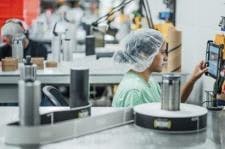Case Study: Kala using FileMaker to label the labels
Labels and packaging have a straightforward but essential function: to tell people what they're buying, what’s in it and who made it (imagine a grocery aisle without labels). Perhaps that’s why the industry that prints labels and packaging saw few changes in more than 100 years. Even today, most printers use flexographic presses that rely on large, flexible plates that work like giant stamps.
But in 2002, the founder of Kala, originally called FlexTech, decided he wanted to do something different: create a labels- and packaging-printing company that used digital printing instead of plates. An app built on the FileMaker Platform came soon after.
Putting "all their eggs in the digital basket"
Traditionally, printing labels and packaging requires a long setup process. It only pays when you’re running the same label over and over again, the way you would on high volumes of a single product, like a ketchup bottle, according Nalani Bird, director of communications at Kala.
With digital printing, Kala had total freedom to print labels individually, modify old designs and do it all much faster than other companies. Even if a label looked the same, Kala could include a unique barcode or QR code—something as individual as a fingerprint. Labels like that allowed Kala to track products better than the vast majority of other printers in the industry.
Soon, Kala was doing 5,000 to 10,000 unique print jobs a month. “That’s the same most traditional shops our size do in a year," said Ryan Chai, a solutions architect at Kala.
With its complex menu of offerings, Kala needed a platform that could organize and streamline orders all the way through the production process. Shortly after the company was founded in 2002, executives realized that Kala needed an app that was as customizable as Kala’s products. They commissioned a custom app built on the FileMaker Platform.
Kala started using the app to manage its orders, and to lighten the load on customer-service representatives and other employees in the 70-person company. Soon, Kala was storing its production artwork in the app, too. If a manufacturer needed more labels, it no longer required multiple phone calls. Instead, permissions were given ahead of time. Kala also started storing the data from each batch of labels in the app. That information came in handy when recalls of the product or label happened.
Before Kala started using the FileMaker Platform, a recall could take one to two months to sort out. With all the data in the app, it only took 20 minutes.
“That was a huge improvement in responsiveness, which is critical in line with a recall situation,” saidWorking from front to back, greeting customers, supporting employees
Kala uses its app across all aspects of the business. When customers walk in the door, they sign in on an iPad device at the front desk that’s loaded with the app.
Further inside the office, large televisions in the production area show the app dashboard with all of the jobs that are going to press that day. Up-to-date graphs show how many prints the company is producing, so management can see whether they’re keeping pace with their goals.
There’s an iPad device next to each printing station where workers use the app to go through a quality inspection, scan the labels being produced, make sure they’re in the correct order, and make tags to identify each roll of labels (some of which are on rolls 10,000 feet long and 30 inches wide).
Customers use the app, too, and Kala is now turning their focus to customer experience. Customers are able to approve prints online with the app before they’re made. Then, as the prints are created, made and shipped, they are be able to monitor the entire process — from print approval to shipping — through the app.
“With the FileMaker Platform we’re able to take our wildest ideas and bolt them on,” Johnson added.
And, like Kala, the app can adapt. "It was the clear winner because we could execute our ideas so much faster than we could on other platforms," said Lewis. "And we have so many ideas for where we’re going to take this technology."






